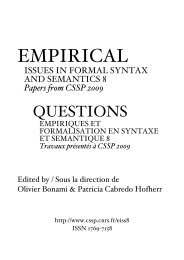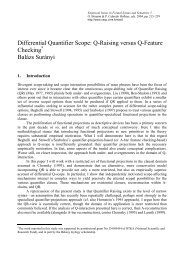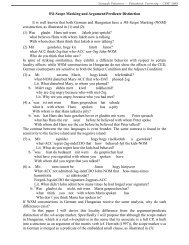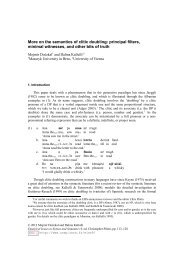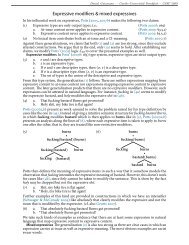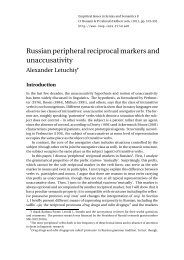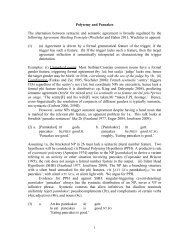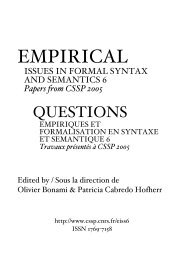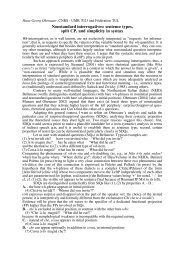Empirical Issues in Syntax and Semantics 9 (EISS 9 ... - CSSP - CNRS
Empirical Issues in Syntax and Semantics 9 (EISS 9 ... - CSSP - CNRS
Empirical Issues in Syntax and Semantics 9 (EISS 9 ... - CSSP - CNRS
You also want an ePaper? Increase the reach of your titles
YUMPU automatically turns print PDFs into web optimized ePapers that Google loves.
dire (‘say’) or suggérer (‘suggest’): with the <strong>in</strong>dicative, these are verbs of communication (class<br />
(i)), while they are verbs of <strong>in</strong>fluence (m<strong>and</strong>atives, class (vii-a)) when the complement clause is<br />
<strong>in</strong> the subjunctive.<br />
(31) a. Paul a {dit / suggéré} que tu étais IND venu.<br />
Paul said / suggested that you had come.<br />
b. Paul a {dit / suggéré} que tu viennes SUBJ immédiatement.<br />
Paul said/ suggested that you (should) come immediately<br />
Another example is that of admettre (‘admit, accept’), comprendre (‘underst<strong>and</strong>’), concevoir<br />
(‘underst<strong>and</strong>’) (see references <strong>in</strong> Soutet 2000), although the difference is more subtle.<br />
(32) a. […] je crois comprendre que vous avez IND le désir d’en faire un métier, de gagner<br />
votre vie en publiant des livres. (A. Boudard, Mourir d’enfance, 1995, p. 227,<br />
Frantext)<br />
I seem to underst<strong>and</strong> that you want to turn it <strong>in</strong>to a job, to make a liv<strong>in</strong>g by<br />
publish<strong>in</strong>g books<br />
b. Je comprends que vous soyez SUBJ anticommunistes … Moi, à votre place je le serais<br />
aussi, c’est normal.<br />
It’s underst<strong>and</strong>able that you are anti-communists … In your stead, I would be too, it’s<br />
normal (E. Rochant, Un monde sans pitié, 1990, p. 71, Frantext)<br />
(33) Ell’ m’emmerde, ell’ m’emmerd’, j’admets que ce Claudel<br />
Soit SUBJ un homm’ de génie, un poète immortel,<br />
J’ reconnais son prestige,<br />
Mais qu’on aille chercher dedans son œuvre pie<br />
Un aphrodisiaque, non, […] (G. Brassens, poèmes et chansons, 1981, p. 212, Frantext)<br />
She makes me mad, I accept that this Claudel is a man of genius, an immortal poet, I<br />
recognize his prestige, but that someone fetch <strong>in</strong> his pious work an aphrodisiac, no, […]<br />
With the <strong>in</strong>dicative, these verbs belong clearly to class (ii): they are verbs of reason<strong>in</strong>g.<br />
They rema<strong>in</strong> verbs of reason<strong>in</strong>g with the subjunctive, but take on an evaluative trait:<br />
‘underst<strong>and</strong>able, normal’. Moreover, with the subjunctive, it is not clear that the subject is<br />
committed to the truth of the proposition, <strong>in</strong> fact, the construction gives the opposite<br />
impression: if the agent commits himself, it is only temporarily, as a step <strong>in</strong> the argumentation.<br />
In particular, we often have the imperative admettons que, lead<strong>in</strong>g to: ‘<strong>and</strong> now what follows?’<br />
Admettre <strong>in</strong> the comb<strong>in</strong>ation with the subjunctive often occurs as the first gesture <strong>in</strong> a<br />
concessive structure: ‘I grant you that p, but’, which is exemplified <strong>in</strong> (33).<br />
Whether or not one treats these usages as belong<strong>in</strong>g to one lexeme or two, the behavior of<br />
such forms conforms to the above analysis.<br />
4.2. Mixed predicates<br />
Other predicates are compatible with both moods, without chang<strong>in</strong>g semantic class. Rather,<br />
they are sensitive to their environment, so that the subjunctive <strong>and</strong> the <strong>in</strong>dicative tend to appear<br />
<strong>in</strong> different environments. However, this is but a tendency, both moods be<strong>in</strong>g possible <strong>in</strong> all<br />
environments. We give a number of cases which have been noted <strong>in</strong> the literature. A systematic<br />
search <strong>in</strong> corpora is needed, s<strong>in</strong>ce the class has not been recognized as such, <strong>and</strong> the factors<br />
<strong>in</strong>volved are not really known.<br />
140



